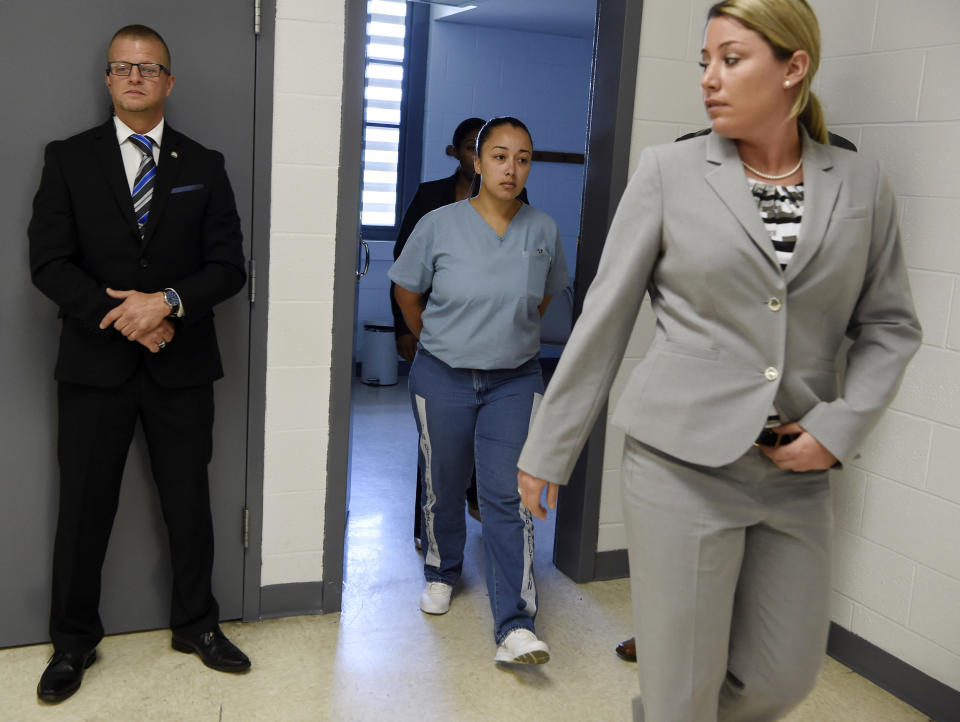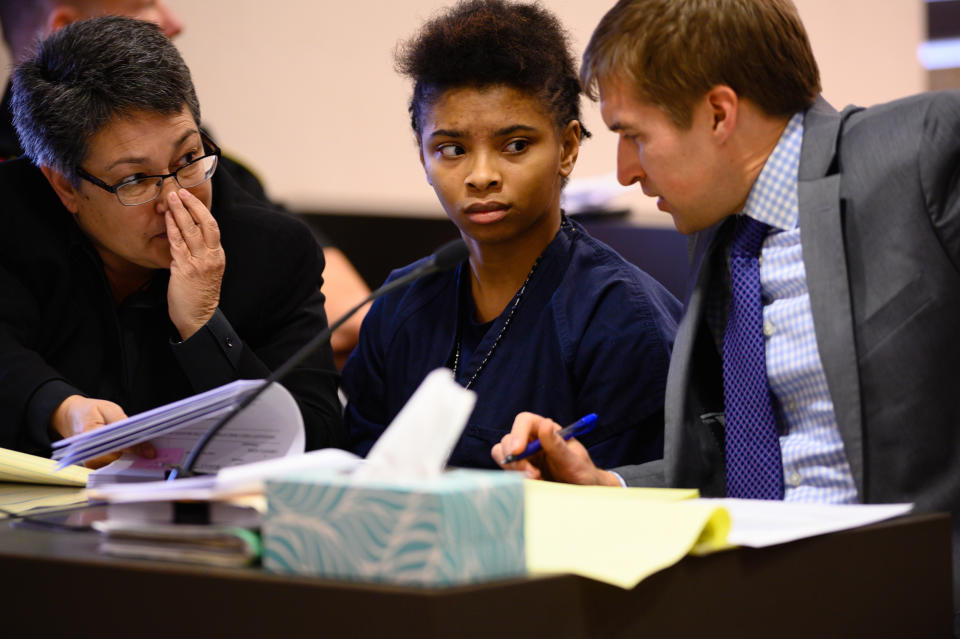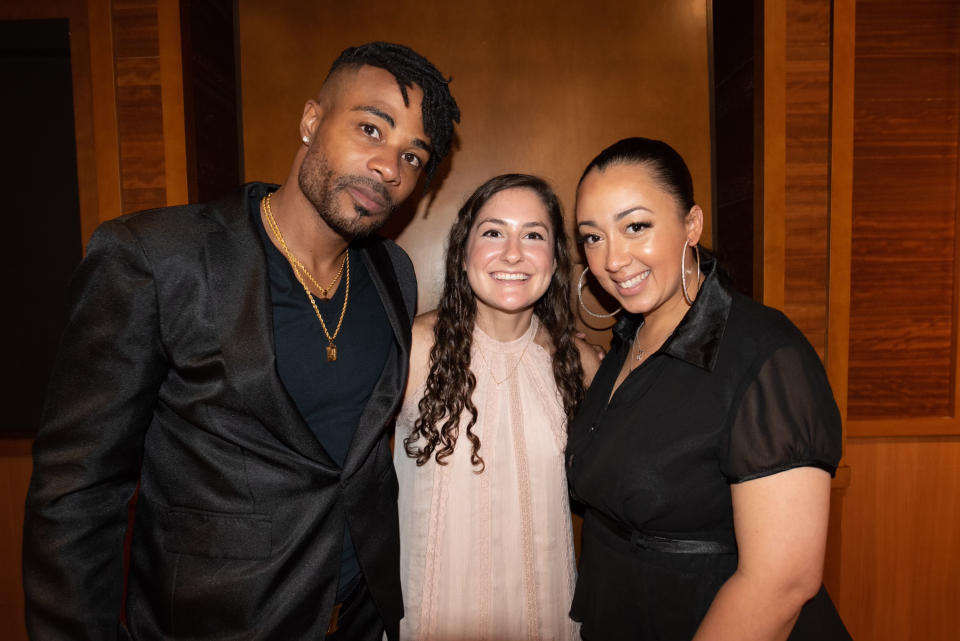Sex-trafficking victims work to change how they're viewed, and how to defend themselves in court
- Oops!Something went wrong.Please try again later.
NASHVILLE, Tenn. — Cyntoia Brown-Long, now free after serving 15 years of a life sentence for killing a man after being forced into prostitution, has made it her mission to help women and girls in situations she once found herself in.
Brown-Long, 34, runs the Foundation for Justice, Freedom and Mercy, a nonprofit based in Nashville that mentors girls at risk of being exploited. She does it in partnership with Epic Girl, an organization with similar goals, and speaks to women and groups across the country about her experiences.
The work she and others are doing is slowly changing how sex-trafficking victims who commit crimes can defend themselves in court and how the criminal justice system and society views them.
“I’m literally living the life that I dreamed about,” said Brown-Long, who also runs JFAM Consulting LLC, a firm dedicated to developing new approaches for correctional agencies.

At 16, she was a runaway living with her 24-year-old boyfriend, known as “Kut Throat,” who she says raped and abused her and forced her into prostitution.
In 2004, she met Johnny Mitchell Allen, 43, who allegedly paid her for sex. She said he took her to his house in Nashville, where she shot and killed him when they were in bed after she saw him reaching for what she believed to be a gun.
Her lawyers argued she did it in self-defense, but prosecutors successfully challenged the claim. She was convicted of first-degree murder and aggravated robbery in 2006 at 18 years old. Tried as an adult, she was ordered to serve 51 years in prison before being eligible for parole.
In 2019, after her case gained celebrity attention, then-Tennessee Gov. Bill Haslam granted her full clemency. She had already served 15 years.
“I’m not going to let you down,” Long-Brown told the state parole board as she pleaded for her release.

She said it took her years to consider herself a trafficking victim.
“My situation wasn’t considered to be trafficking, they called it teen prostitution,” she said, adding that many of the girls she works with felt they had nowhere else to go.
“These are runaways … whether it’s because their home life wasn’t the greatest or because they have trouble,” Long-Brown said. “Now they find themselves on the streets and they can’t go get a job. They can’t do the things that other people would do — put a roof over their heads and put food in their mouth.
“But then they’ll run into adults, adult males who will take advantage and so, actually, they don’t see themselves as being victimized. They see that they’re going to survive. And so they’re just trying to be good.”
Of the more than 25,000 cases of children and teenagers who had run away from home and were reported missing to The National Center for Missing and Exploited Children in 2021, 1 in 6 were most likely the victims of sex trafficking, the center said, with 64% of them minors and 96% Black, Latino or another racial minority.
Like Brown-Long, other sex-trafficking victims have killed their alleged abusers or pimps. In 1995 in California, Sara Kruzan, 16, was sentenced to life without the possibility of parole for killing George Gilbert Howard as he attempted to sexually assault her. He had sex-trafficked her for years, starting when she was a teenager.

Her sentence was commuted to 25 years to life by then-Gov. Arnold Schwarzenegger in 2010, and three years later, she was re-sentenced to 19 years to life. After serving 18 years in prison, she was released by then-Gov. Jerry Brown, and she was officially pardoned in July by Gov. Gavin Newsom.
And sex-trafficking survivor Alexis Martin was 15 when she collaborated with a friend and two other people to rob the home of her pimp, Angelo Kerney, who was killed during the incident, according to court documents. Martin was sentenced to prison in 2013 at age 17 for her role in the shooting.
Through advocates, including Kim Kardashian, who featured Martin on Oxygen’s “Kim Kardashian West: The Justice Project,” she was freed in 2020 after Ohio Gov. Mike DeWine partially commuted her sentence.
Martin was sent back to prison in February to serve the remainder of her initial 21-years-to-life sentence after she violated the conditions of her parole, according to The Washington Post.
This year, sex-trafficking victims are looking to the case of Chrystul Kizer as a possible step forward. The Wisconsin Supreme Court ruled in July that Kizer, 22, will be allowed to argue self-defense in the 2018 shooting death of Randall Volar III, who she says sexually abused her when she was a minor.
She is also accused of robbing Volar and setting fire to his home before killing him when she was 17.

The court found that a crime “that is unforeseeable or that does not occur immediately after a trafficking offense is committed can be a direct result of the trafficking offense, so long as there is still the necessary logical connection between the offense and the trafficking.”
Although some advocates say Kizer’s case demonstrates how far the legal system has come in trying to better understand victims of sex trafficking, particularly children, others are not so sure.
“When we’re talking about more serious offenses, offenses, where for example, a life was lost, or someone was physically injured, there is a tremendous amount of resistance in terms of changing our view of the person who committed that act,” said Kate Mogulescu, an assistant professor of clinical law at Brooklyn Law School.
Brown-Long said people who work in the criminal justice system often talk about helping victims but hesitate when they commit crimes or make mistakes.
“The minute one of them crosses that line, then you think, ‘Oh, now they’re a criminal. Now we have to lock them away for good,’” she said. “What happened to you caring about them as an abuse victim?”
Brown-Long remains on probation through 2029 and has to carry a card that identifies her as a "violent offender" in case she gets pulled over by police. She must also undergo routine drug tests.
She was freed from prison with the help of law student Gabby Cannone, whom she met through Canonne’s sister, Adrianna, when the two attended class inside the Tennessee Prison for Women. Lipscomb University in Nashville offered a program that enabled students and incarcerated women to learn together.

Cannone, who helped prepare Brown-Long’s clemency application, said working on the case gave her a better understanding of what leads young women and girls to become victims of sex trafficking.
“I think that it opened my eyes to see the depth of brokenness to a greater extreme than what I had before,” she said in a phone interview.
Cannone now works as a law clerk advocating for women and children who are victims of sex trafficking.
Brown-Long continues to push for change in Tennessee, where a first-degree murder conviction carries a minimum sentence of 51 years in prison, regardless of age. The Tennessee Supreme Court is debating whether that requirement is too harsh for juveniles.
Brown-Long said she sees some hope in the case of 17-year-old Pieper Lewis, a sex trafficking survivor who was ordered by an Iowa judge last month to pay $150,000 in restitution to the family of her accused rapist instead of serving time for first-degree murder.
“Even though the prosecutors acknowledged that she was a victim in this situation … over the next five years, anything that she does can trigger her having to serve a 20-year sentence,” Brown-Long told PBS NewsHour last month.
“I wouldn’t call it justice exactly. However, it is a lot better than what it could have been.”
This article was originally published on NBCNews.com

